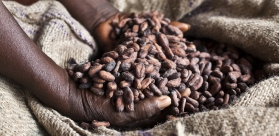User login

Practical publications | farmer income
This paper examines the relative profitability of certified organic and conventional farming in sub-Saharan Africa, using household data of smallholder farmers involved with certified organic Arabica coffee, cocoa-vanilla, and pineapple. The surveys were conducted in eastern, western and central...
The paper examines the case of cocoa as an illustration of the problems faced by primary commodity producers and attempts to show that the conditions are favourable for cocoa producers to coordinate their production policies in order to maintain satisfactory cocoa prices, which is needed to...
To achieve a more sustainable world cocoa economy the industry needs to start taking more focused action as soon as possible. Data on the current situation needs to be collected, publicly reported, activities towards sustainability goals need to be developed and the resulting improvements should...
A number of studies were recently launched on certified organic production in Uganda and Tanzania, focusing on quantifying the economic and social impacts of organic conversion, but also addressing organizational, institutional and technology issues. This paper summarizes the results of two of...
This paper examines the revenue effects of certified organic contract farming and of use of organic farming methods in a tropical African context, using survey data from a medium-size cocoa-vanilla contract farming scheme in Uganda. These are compared with ‘organic by default’ conventional...
This report analyses the position of women in the cocoa chain and the constraints they face. It is partly based on a field study conducted in Cote d’Ivoire. It also analyses the current policies of UTZ Certified and CSN/ Solidaridad with regard to gender issues. Practical examples of women’s...
In this report, Oxfam assesses the social and environmental impacts of the world’s ten largest food and beverage companies and calls on them to take the critical next steps to create a just food system. Today, a third of the world’s population relies on small-scale farming for their livelihoods...
A study to determine the financial profitability of cocoa agroforests enriched with domesticated trees was carried out in 2009. The study site was the Cocoa Production Basin of Centre Cameroon. Rationale: One of the main tree-based systems in the West and Central Africa region is the cocoa...
This report aims to enhance understanding of the position of Ghana’s cocoa farmers and their communities with respect to their livelihood in the context of a dynamic chocolate value chain. It deals with a wide range of subjects, including youth employment, youth aspiration, the future...
In Ghana, the liberalization of internal marketing started in 1992 with the introduction of private Licensed Buying Companies (LBCs) as competitors to the state-owned monopoly in buying cocoa from farmers. Thus, Ghana’s state-owned Marketing Board (Cocobod) still controls external marketing....



